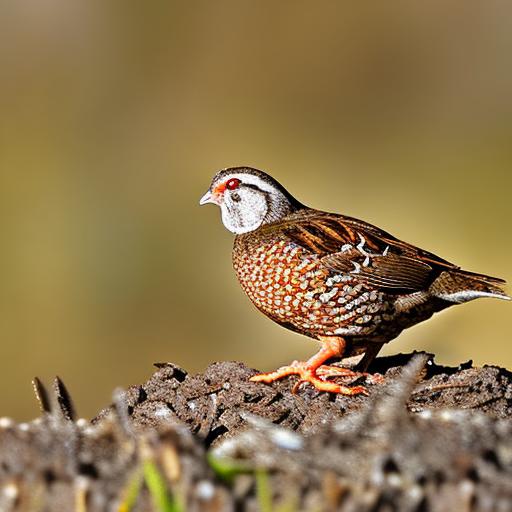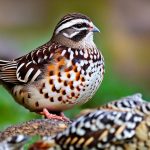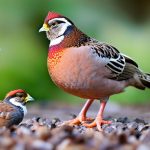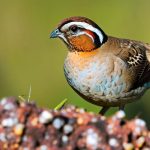Hen quail, also known as female quail, are small, ground-dwelling birds that are popular for their delicious eggs and meat. They are a domesticated species of quail that are relatively easy to care for and can be a great addition to a backyard farm or homestead. Hen quail are known for their gentle nature and can be easily raised in small spaces, making them an ideal choice for urban farmers or those with limited land. These birds are also known for their high egg production, making them a valuable addition to any poultry operation. With the right care and attention, hen quail can provide a sustainable source of protein for their owners.
Hen quail are typically smaller and more docile than their male counterparts, making them easier to handle and care for. They are also known for their quiet nature, making them a great choice for those who live in urban or suburban areas where noise may be a concern. Hen quail are also prolific layers, with the ability to produce up to 300 eggs per year, making them a valuable asset for those looking to raise their own food. Additionally, hen quail are relatively low maintenance, requiring minimal space and resources compared to other poultry species. Overall, hen quail are a versatile and valuable addition to any small-scale farming operation.
Key Takeaways
- Hen quail are small, ground-dwelling birds that are popular for their eggs and meat production, as well as for their charming personalities.
- Keeping only hen quail can be beneficial for those looking for a low-maintenance, high-yield poultry option, as they are quieter and less aggressive than mixed-gender quail flocks.
- When housing and caring for hen quail, it’s important to provide them with a secure and spacious enclosure, as well as proper bedding and nesting areas for their comfort and safety.
- Feeding and nutrition for hen quail should include a balanced diet of commercial quail feed, supplemented with fresh greens, fruits, and grit for digestion.
- Breeding and reproduction of hen quail can be successful with the right conditions, including a proper male-to-female ratio, adequate nesting space, and a stress-free environment.
- Health and disease management for hen quail involves regular monitoring for signs of illness, providing clean water and living conditions, and seeking veterinary care when necessary.
- In conclusion, successful hen quail keeping can be achieved by providing a suitable environment, balanced nutrition, and proactive health management for these delightful birds.
Benefits of Keeping Only Hen Quail
There are several benefits to keeping only hen quail, especially for those who are looking to raise their own food in a sustainable and efficient manner. One of the main benefits of keeping only hen quail is their high egg production. Hen quail are known for their ability to lay a large number of eggs throughout the year, providing a valuable source of protein for their owners. This can be especially beneficial for those who are looking to become more self-sufficient and reduce their reliance on store-bought eggs.
Another benefit of keeping only hen quail is their small size and low maintenance requirements. Hen quail require minimal space and can be easily housed in small enclosures, making them an ideal choice for those with limited land or resources. Additionally, hen quail are relatively low maintenance compared to other poultry species, requiring less feed and care overall. This makes them a great option for those who are new to raising poultry or who have limited time to dedicate to animal care.
Housing and Care for Hen Quail
When it comes to housing and caring for hen quail, there are a few key considerations to keep in mind. First and foremost, it’s important to provide hen quail with a safe and secure enclosure that protects them from predators and the elements. This can be achieved by using a sturdy wire mesh or fencing material to create a coop or enclosure that is both predator-proof and well-ventilated. It’s also important to provide hen quail with plenty of space to move around and exercise, as this can help prevent boredom and aggression within the flock.
In addition to providing a secure enclosure, it’s important to provide hen quail with a comfortable nesting area where they can lay their eggs. This can be achieved by providing nesting boxes filled with soft bedding material, such as straw or wood shavings. It’s also important to keep the nesting area clean and free of debris, as this can help prevent the spread of disease and ensure that the eggs remain clean and healthy. Finally, it’s important to provide hen quail with access to fresh water and a balanced diet to ensure that they remain healthy and productive.
Feeding and Nutrition for Hen Quail
Feeding and nutrition are important aspects of caring for hen quail, as a balanced diet is essential for their health and productivity. Hen quail should be provided with a high-quality commercial feed that is specifically formulated for laying hens. This feed should contain the necessary nutrients, vitamins, and minerals that hen quail need to lay healthy eggs and maintain good overall health. In addition to commercial feed, hen quail can also be supplemented with fresh fruits and vegetables, as well as small amounts of protein-rich treats such as mealworms or crickets.
It’s important to provide hen quail with access to fresh, clean water at all times, as dehydration can quickly lead to health issues and decreased egg production. Water should be provided in shallow dishes or waterers that are easy for the quail to access. It’s also important to regularly clean and refill water dishes to prevent the spread of disease and ensure that the water remains clean and palatable. Overall, providing hen quail with a balanced diet and access to fresh water is essential for their health and productivity.
Breeding and Reproduction of Hen Quail
Breeding and reproduction are important aspects of raising hen quail, especially for those who are looking to maintain a sustainable flock over time. Hen quail typically reach sexual maturity at around 6-8 weeks of age, at which point they will begin laying eggs. It’s important to provide hen quail with a comfortable nesting area where they can lay their eggs, as well as access to a balanced diet that supports healthy egg production.
Once hen quail begin laying eggs, it’s important to collect the eggs regularly to prevent them from being damaged or eaten by the hens. Collected eggs can be used for consumption or incubated in order to hatch new chicks. Incubation typically takes around 17-18 days, after which the chicks will hatch and require careful care and attention in order to thrive. Overall, breeding and reproduction are important aspects of raising hen quail, and with the right care and attention, it’s possible to maintain a healthy and sustainable flock over time.
Health and Disease Management for Hen Quail
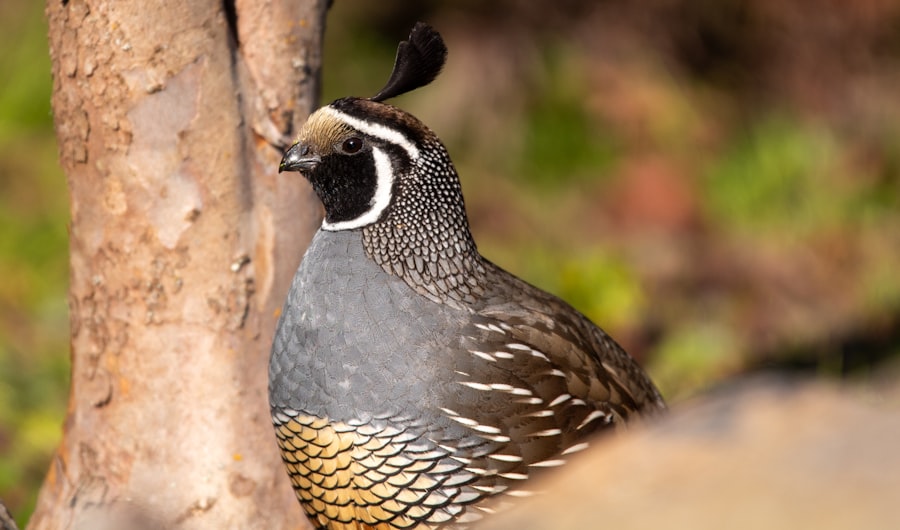
Maintaining the health of hen quail is essential for their overall well-being and productivity. There are several key aspects of health and disease management that should be considered when caring for hen quail. First and foremost, it’s important to provide hen quail with a clean and well-ventilated living environment that is free from drafts, dampness, and excessive heat. This can help prevent respiratory issues and other health problems that can arise from poor living conditions.
It’s also important to regularly monitor the health of the flock and be on the lookout for any signs of illness or distress. Common signs of illness in hen quail include lethargy, decreased appetite, abnormal droppings, or changes in behavior. If any signs of illness are observed, it’s important to isolate the affected bird from the rest of the flock and seek veterinary care if necessary. Additionally, it’s important to practice good biosecurity measures in order to prevent the spread of disease within the flock.
Tips for Successful Hen Quail Keeping
In conclusion, keeping hen quail can be a rewarding experience for those who are looking to raise their own food in a sustainable and efficient manner. By providing hen quail with a safe and secure living environment, a balanced diet, and regular monitoring of their health, it’s possible to maintain a healthy and productive flock over time. Whether you’re new to raising poultry or have years of experience, hen quail can be a valuable addition to any small-scale farming operation. With the right care and attention, hen quail can provide a sustainable source of protein for their owners while also adding beauty and diversity to the farm or homestead.
If you’re considering keeping only hen quail, you may also be interested in learning how to turn a shed into a chicken coop. This related article from Poultry Wizard provides valuable insights and tips on creating a suitable living space for your poultry. Check out the article here to discover practical advice for transforming a shed into a comfortable and functional home for your quail.
FAQs
What is the benefit of keeping only hen quail?
Keeping only hen quail can be beneficial for those who are interested in egg production. Hens are known for their high egg-laying capabilities, making them a popular choice for poultry farmers and backyard enthusiasts.
How do you identify a hen quail?
Hen quail can be identified by their physical characteristics, such as their smaller size, rounded chest, and more subdued coloration compared to male quail. Additionally, hens will exhibit broody behavior and may lay eggs.
What are the housing requirements for hen quail?
Hen quail require a secure and well-ventilated housing structure that protects them from predators and the elements. The housing should also provide nesting boxes for the hens to lay their eggs and roosting areas for resting.
What do hen quail eat?
Hen quail are omnivores and require a balanced diet of commercial quail feed, supplemented with fresh greens, grains, and protein sources such as mealworms or small insects. Access to clean water is also essential for their health and egg production.
How do you care for hen quail?
Caring for hen quail involves providing them with a clean and safe environment, a balanced diet, regular health checks, and proper handling to minimize stress. Additionally, ensuring that they have access to nesting areas and a suitable environment for egg-laying is important for their well-being.
Meet Walter, the feathered-friend fanatic of Florida! Nestled in the sunshine state, Walter struts through life with his feathered companions, clucking his way to happiness. With a coop that’s fancier than a five-star hotel, he’s the Don Juan of the chicken world. When he’s not teaching his hens to do the cha-cha, you’ll find him in a heated debate with his prized rooster, Sir Clucks-a-Lot. Walter’s poultry passion is no yolk; he’s the sunny-side-up guy you never knew you needed in your flock of friends!

